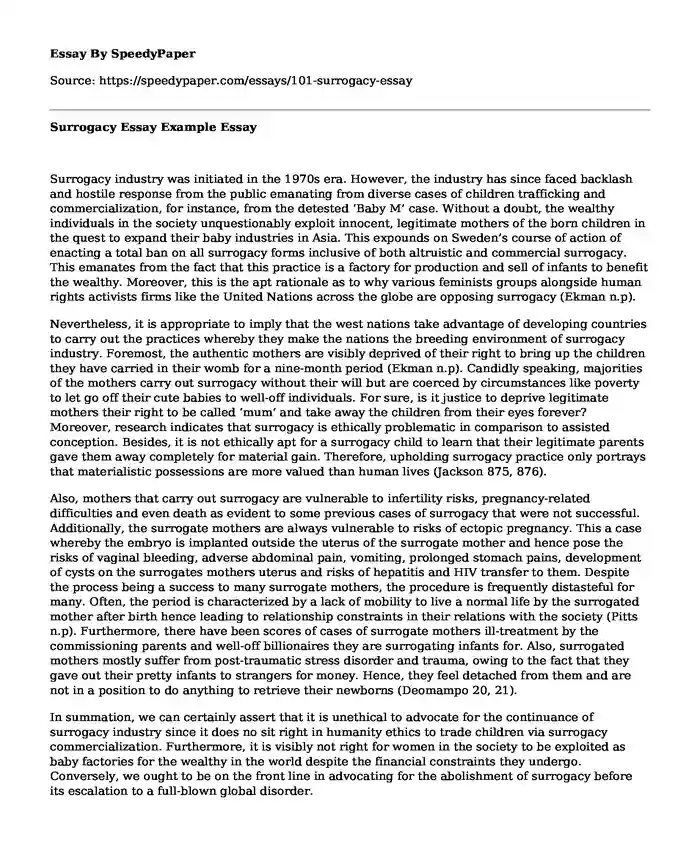Surrogacy industry was initiated in the 1970s era. However, the industry has since faced backlash and hostile response from the public emanating from diverse cases of children trafficking and commercialization, for instance, from the detested ‘Baby M’ case. Without a doubt, the wealthy individuals in the society unquestionably exploit innocent, legitimate mothers of the born children in the quest to expand their baby industries in Asia. This expounds on Sweden’s course of action of enacting a total ban on all surrogacy forms inclusive of both altruistic and commercial surrogacy. This emanates from the fact that this practice is a factory for production and sell of infants to benefit the wealthy. Moreover, this is the apt rationale as to why various feminists groups alongside human rights activists firms like the United Nations across the globe are opposing surrogacy (Ekman n.p).
Nevertheless, it is appropriate to imply that the west nations take advantage of developing countries to carry out the practices whereby they make the nations the breeding environment of surrogacy industry. Foremost, the authentic mothers are visibly deprived of their right to bring up the children they have carried in their womb for a nine-month period (Ekman n.p). Candidly speaking, majorities of the mothers carry out surrogacy without their will but are coerced by circumstances like poverty to let go off their cute babies to well-off individuals. For sure, is it justice to deprive legitimate mothers their right to be called ‘mum’ and take away the children from their eyes forever? Moreover, research indicates that surrogacy is ethically problematic in comparison to assisted conception. Besides, it is not ethically apt for a surrogacy child to learn that their legitimate parents gave them away completely for material gain. Therefore, upholding surrogacy practice only portrays that materialistic possessions are more valued than human lives (Jackson 875, 876).
Also, mothers that carry out surrogacy are vulnerable to infertility risks, pregnancy-related difficulties and even death as evident to some previous cases of surrogacy that were not successful. Additionally, the surrogate mothers are always vulnerable to risks of ectopic pregnancy. This a case whereby the embryo is implanted outside the uterus of the surrogate mother and hence pose the risks of vaginal bleeding, adverse abdominal pain, vomiting, prolonged stomach pains, development of cysts on the surrogates mothers uterus and risks of hepatitis and HIV transfer to them. Despite the process being a success to many surrogate mothers, the procedure is frequently distasteful for many. Often, the period is characterized by a lack of mobility to live a normal life by the surrogated mother after birth hence leading to relationship constraints in their relations with the society (Pitts n.p). Furthermore, there have been scores of cases of surrogate mothers ill-treatment by the commissioning parents and well-off billionaires they are surrogating infants for. Also, surrogated mothers mostly suffer from post-traumatic stress disorder and trauma, owing to the fact that they gave out their pretty infants to strangers for money. Hence, they feel detached from them and are not in a position to do anything to retrieve their newborns (Deomampo 20, 21).
In summation, we can certainly assert that it is unethical to advocate for the continuance of surrogacy industry since it does no sit right in humanity ethics to trade children via surrogacy commercialization. Furthermore, it is visibly not right for women in the society to be exploited as baby factories for the wealthy in the world despite the financial constraints they undergo. Conversely, we ought to be on the front line in advocating for the abolishment of surrogacy before its escalation to a full-blown global disorder.
Work Cited
Deomampo, Daisy. Transnational Reproduction: Race, Kinship, and Commercial Surrogacy in India. New York: New York University Press, 2016. Print
Ekman, Ekis, Kajsa. All Surrogacy is Exploitation-The World Should Follow Sweden’s Ban. Retrieved on 25th Feb 2016 from,
https://www.theguardian.com/commentisfree/2016/feb/25/surrogacy-sweden-ban
Jackson, Emily. Medical Law: Text, Cases, and Materials. Oxford: Oxford University Press, 2016. Print.
Pitts, Jonathan. “What Are The Risks of Surrogate Motherhood?” Health Guidance for Better Health.
http://www.healthguide.org/entry/11666/1/What-Are-the-Risks-of-Surrogate-Motherhood.html
Cite this page
Surrogacy Essay Example. (2018, Jun 19). Retrieved from https://speedypaper.net/essays/101-surrogacy-essay
Request Removal
If you are the original author of this essay and no longer wish to have it published on the SpeedyPaper website, please click below to request its removal:
- HR Management Essay Example on Cross-cultural Players in India
- The History of Androscoggin Mill and Environmental Issues in Our Free Essay
- Descriptive Narrative Essay Sample
- Organizations' Shared Vision, Leadership Essay Example
- Feminism Theory in Analysis of Poems
- Product Analysis Essay Sample: Toyota Land Cruiser
- The Effects of Alcohol Abuse on Adolescents - Paper Example
Popular categories





